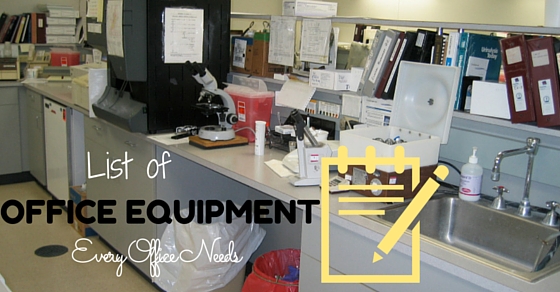What is Office Equipment?
Office equipment is nothing but things purchased by the company, that helps in conducting office-related tasks or work. They serve as a long-lasting asset to the company. Also, office equipment is just the need and requirement of the company.
Setting up a company isn’t so easy, even though money plays a crucial role in it, you may still need to manage a few basic things like place, types of equipment, hiring, etc. Here we will be focusing on a few important items necessary for an efficient office setup.
 Setting up an office is distressing for mainly two reasons:
Setting up an office is distressing for mainly two reasons:
- Either you are unable to identify the equipment you need.
- You have a clear idea of what you need but the thought of meeting all the needs seems daunting.
But, Why is office equipment necessary after all? Here we have explained a necessity, list of office equipment and its importance
Basic Office Equipment List:
Here are a few items you need to set up an efficient office. Have a look at the checklist
| Basic Office Equipment List | ||
|---|---|---|
| High-Speed Internet Access | Software | Surge Protector |
| Computer | Telephone and/or VoIP | File Cabinet |
| Monitor | Network Router | Uninterruptible Power Supply (UPS) |
| Adequate Lighting | Backup Drive or Personal Server | Paper Shredder |
| Desk | Printer or Multipurpose Machine | Fire-Safe Box |
| Chair | Storage |
Depending upon your business niche and the clients or people you serve, there may be an additional list of office equipment you might require. For now, the above list of items can help you arrange everything in sequential order.
List Of Office Supplies:
Before moving on, we have to understand one thing very clearly that there is a difference between office equipment and office supplies.
Office Equipment and Office Supplies:
Office equipment is the asset purchased by the organization, which is used while working for the company. The equipment here means, tables, chairs, computers, etc.
Office supplies are the kind of things that are utilized on a regular basis like stationary, simple office accessories, etc.
In simpler words, the office stationery which you will be mentioning here are the things that are used on a day to day basis, irrespective of whichever company you are in. Some of the Essential List Of Office Supplies are
Office Supplies List for Desktop & Desk Drawers:
- Pens, pencils, erasers, pencil sharpener
- Permanent markers
- Highlighter Pens
- Paper clips
- Binder clips
- Stapler, staples
- Tape dispenser, extra rolls of tape
- Glue sticks
- Rubber bands
- Scissors
- In/Outbox for paperwork
- 3 hole punch
- Calculator
To keep the items separated and organized use a Desk drawer organizer
Paper & Stationery Supplies:
- Envelopes (of all sizes)
- Printer paper
- Stamps
- Return address labels
- Stationery/thank you notes/Sticky notes
- Notepads
- Printer ink/toner/cartridges
- Supplies for mailing packages
Filing Supplies:
- File cabinet or file box
- All type of file folders, plus tabs
- File labels
- 3 ring binders
- Index Dividers
- Calendar & Planning Supplies
- Calendar (desk or wall version)
- Planner
- To-do list
- Whiteboard or bulletin board
1. The necessity of Office Equipment:
The secret to the smooth running of an establishment lies in its team. The team hired must not only fit the bill but also stay focused and be efficient. For efficiency, the employee must be equipped with the right tools, equipment, and office supplies.
Good quality office equipment and office supplies not only increases the productivity of employees but also sends out a good message to the client and public in general.
For example, an office with a chaotic, congested reception area with innumerable papers stacked on the table makes the place look extremely messy and unorganized. Needless to say, prospective clients do not get a good impression – no matter how good the business or the product is. In an office, everything must be in place, arranged neatly and labelled systematically.
In addition to giving a good impression, this would also help the employees in their work since everything is arranged in an easy-to-locate manner. Such arrangements throw the chaos factor out of the window.
2. List of office equipment and machines:
Once the need is established, the next obvious question is ‘what’ like,
“What is the various office equipment needed?”
Some of the office machines examples are computer screens including papers, pens, crockery, calculators, furniture, etc. In fact, the office equipment list is endless but they can be categorized as technology, software, furniture, and stationery.
Each equipment plays a role on its own in the office. Read on to know more about each of them.
3. Latest Technology at the Workplace:
Technology has come a long way in the past two centuries. Offices are going the digital way and the need for paper has decreased considerably.
Complete paperless office era is not yet in, but the digital world has taken nearly 60% of office load. Hence, different technological equipment such as printers, projectors, scanners, copiers that are needed by an office fall under this category.
These are essential since they help increase the efficiency of employees and thus help in the overall growth of the organization.
Pieces of Office Equipment That Every Office Needs:
Below mentioned are few office types of equipment that every office requires
Printers:
An office with at least one computer must have a printer to make hard copies of files and documents. Business documents such as product list, financial dealings, invoices, letters, reports, etc. need to be stored as hard copies.
In addition to transferring the electronic files to paper format, they can also create composite documents containing scanned images and digital information.
Scanners:
While a printer is used to convert electronic documents into a paper format, a scanner does just the opposite- converting hard copies into digital format. These include photographs, cash receipts, hand-filled forms, drawings, identification proofs of employees and even pages from print publications.
Scanners copy these images created on paper and convert them to electronic format so that they can be stored on a computer or emailed.
Photocopying or fax was the most commonly used format before scanners were invented. Photocopying is still followed today at many places.
Copiers:
This is one of the best ways of replicating a document and maintaining a hard copy especially if it is hand-written. There was a time when offices used to employ clerks called ‘scribes’ to create a duplicate copy of a document by typing or rewriting it again.
However, this was a very difficult task and the printing press was not an easy, practical solution. Some offices made use of small printing presses while most of them outsourced the work to large printing presses. Slowly this passed away and offices started using carbon papers, cyclostyling, etc.
Eventually, copying options like roller copiers, copy pads xerographs etc. came into practice. Xerography and copiers are popular copying options – both in black and white as well as colour, even today.
Dictation Machines:
Many offices do not find it important to have this equipment. However, this is one of the most important equipment.
Speech recognition software is available but it is not as efficient and reliable. Typically, in an office, the audio is first recorded by someone, processed into file format by an employee, transcribed by another employee who later emails or prints it.
Typing out every word cannot be done as fast and fluently as speaking. Drafting memos and letters are best done through dictation and recording- especially because it is easier to speak while performing other tasks.
Cassette tapes were popular dictation equipment but modern digital versions are more popular owing to the ease and convenience.
Projectors:
Making presentations are an integral part of any office work whether it is building a strategy, providing training to employees or even making a business proposal.
Simple lecturing and talking are often confusing and needless to say- boring. Using the age-old traditional method of chalk and board is cumbersome since making notes is difficult. Going back to a particular point to clarify doubts is also difficult.
In addition, people find it difficult to keep a record of the meeting. Presentations throw clarity into the picture simply because it is easier to maintain records, clear doubts and also make notes.
So, what does a projector do in the presentation?
Simple- it helps project the presentations on a bigger screen thus grabbing everybody’s attention. You can also share the presentations with colleagues, attendees simply by e-mailing the same to them.
Shredder:
Like dictation machines, shredders also fall into the ‘most important’ office equipment category when it comes to protecting the confidentiality, business and trade secrets.
Ironically, shredders are used to destroy the very same documents that the employees work so hard to produce. Hand tearing is time-consuming and tiring in addition to being ineffective.
Shredders cut papers such that putting them back and recovering the lost information is almost impossible. They are extremely necessary when confidential information and reports relating to human resources are documented.
4. Office Equipment Software:
In this digital age, just a computer does not suffice. You need adequate software to run the computer.
Every office- no matter how small they are- needs a Microsoft Windows to run on. Software is small, but a powerful army that works tirelessly behind the scene to ensure the smooth running of the business.
They create documents, manage e-mails, keep the books, store documents safe, protect documents and even ensure team coordination. A wide range of software equipment is available at affordable prices for every kind of business. The problem is which one to pick.
One advice is to pick the ones that are most necessary as a beginner such as virus protection software and word processing software. Other programs like inventory management, contact management, website building, and maintenance, etc. can be picked up as and when needed.
5. Furniture for Office Use:
Office furniture is an essential part of the office.
If there is no furniture then where would you and the employees sit and work?
Where would you store all the files and important materials?
Chairs, tables, writing desks, stools, and cabinets are some of the essential furniture irrespective of the size of the office. The office furniture must be in line with the color scheme.
The furniture is of different types ranging from traditional wooden ones to modern, contemporary furniture. They are portable and easy to manage and occupy very little space.
Chairs:
There are different types of chairs available for office purposes. The most common ones used are the ones with a contemporary look and have a comfortable backrest that does not put pressure on the spine.
There are some that vary in size with the designation. You can also procure upholstered chairs with good back support. They are easily available at reasonable rates. Some manufacturers even provide chairs customized to your needs as per your design and interiors.
Tables:
Tables in an office must be spacious as well as not bulky. In the sense, they must provide enough space for the employee to arrange all their stuff but must occupy very little space by itself.
Some tables with inbuilt storage cabinets are available which occupy a lot of space. Such tables are also bulky to move around although they accomplish two tasks at the same time.
Alternately, there are tables that simply provide the surface to keep your stuff on but do not provide storage spaces. In such cases, additional cabinets can be provided that fit into the table and give a compact look to the place.
Cabinets:
How will you store the necessary materials if there are no cabinets?
You could be sued for leaving your employee performance reports lying out open on your table. Confidential reports have to be kept locked in cabinets so that they cannot be accessed easily.
This is precisely why cabinets are needed- to lock away the important, confidential matter as well as to store the extra material for back-up needs.
Cabinets are of different sizes. Small cabinets are commonly provided to employees to keep their personal stuff every day. These include their daily necessary items such as their bags, food packets, cosmetic items, etc. Medium-sized cabinets serve administration purposes. They are used to store the extra stationery items such as papers, pens, letter pads, etc. Large cabinets serve the ‘inaccessible’ area purposes. They come with specially designed lockers and are used for the safekeeping of confidential documents, legal papers, money, etc.
Often these lockers have a biometric system and can be opened only by selected management of the establishment. They also contain extra storage space for storing costly equipment and confidential office documents.
6. List of Stationery Items for Office Use:
Office stationery is indispensable for significant office operations, no matter how computerized they are. The stationery plays an important role in doing some key functions at the workstations in an efficient and effective manner.
Some of the items in the list of office stationery include papers, folders, files, pens, diaries, organizers, calendars, paperweights, staplers, punch machines, paperclips, pins, pen stands, etc.
Paper:
Office papers (generally A4 size) are needed all the time for various printing purposes. No matter how paperless an office would be, important documents like appointment letters, invoices, and vouchers must have a hard copy. Paper is also used for printing important notice board highlights.
Although email is the most commonly used form of notifications, yet they are also displayed on the notice board to serve as a reminder notice. Letter pads and dairies are needed for taking notes during meeting and training sessions. All these paper stationery must be supplied by the office to the employees.
Writing Material:
Writing items like ball pens, fountain pens, markers, pencils, highlighters and even writing boards are among the office professionals’ favourites. They must be supplied in abundance given the frequency at which employees misplace the pens.
Folders and Files:
An office is a place wherein the organization plays an important role. Leaving papers lying around and simply stacking the workstation with stuff is not something that is acceptable.
Files and folders step in, to make things organized. Document binders, report covers, cardholders, folders all fall into this category.
7. Kitchen or Pantry Equipment:
The kitchen or pantry requirements may seem ridiculous for an office need but it is an ‘unspoken’ truth. Nobody would accept but everybody would acknowledge the fact that an office that does not have a drinking water facility is ‘poor’ while one with a ‘coffee vending machine’ is a modern corporate establishment.
Basic crockery items like few cups and saucers, disposable glasses, spoons, knives, a drinking water dispenser and possibly a coffee vending machine is necessary as these would be very useful for employees. In addition, clients look upon it as a ‘caring about employees’ factor.
Of course, the above is no way an exhaustive list. The office supplies list varies depending on the type of business establishment.
Essential Office Supplies You Need For a Startup:
Entrepreneurship is the ongoing trend and is nothing new these days. There are many professionals who after working in an organization gain enough experience and think of starting on their own. Though it would be biased to specify the success percentile vs failure percentile but the spark of doing something new is always inspirational and should be motivated.
It is not only the capital or workforce that leads a startup to success but it is the idea or solution they build. But being moved by motivation and success stories it is always important not to miss the practicality. Be it a big enterprise or any startup there are few things which any working space requires and they are known as office equipment. Here we have enlisted a few Essential Office Equipment for Starting a Business.
- Computers
- software
- Laptops
- Internet and network connection
- Telephones
- smartphones
- Scanner
- Multifunctional printer
- Mailing equipment
- Paper shredder
- Desk and chairs
- Filing cabinets
- Storage cabinets
- Decor
- First aid kit
- UPs and power kit
- Basic office stationery
- Pens
- Pencils
- Scissors
- File Folders
- Ruler
- Whiteout
- Sticky notes
- Staple remover
- Stapler
- Paper clips
- Whiteboard markers
- Notepads
- Copy paper
18. Janitorial essentials
- Mop
- Plunger
- Toilet cleaner and brush
- Vacuum cleaner
- Dustpan
- Broom
- Duster
- Dish soap
- All-purpose spray
- Clorox wipes
- Dishcloths and Sponges
- Trash bags
Office Equipment List pdf:
For more information on office equipment, refer to this article (pdf format): nos.org
For example, if it is a pathological laboratory, then you need microscopes, slides, jars, centrifuges etc. A library needs book racks in huge numbers. Therefore, the list of office supplies requirements varies with every kind of business establishment. It is necessary to decide upon the office equipment taking into consideration the type of business that is being run.






































